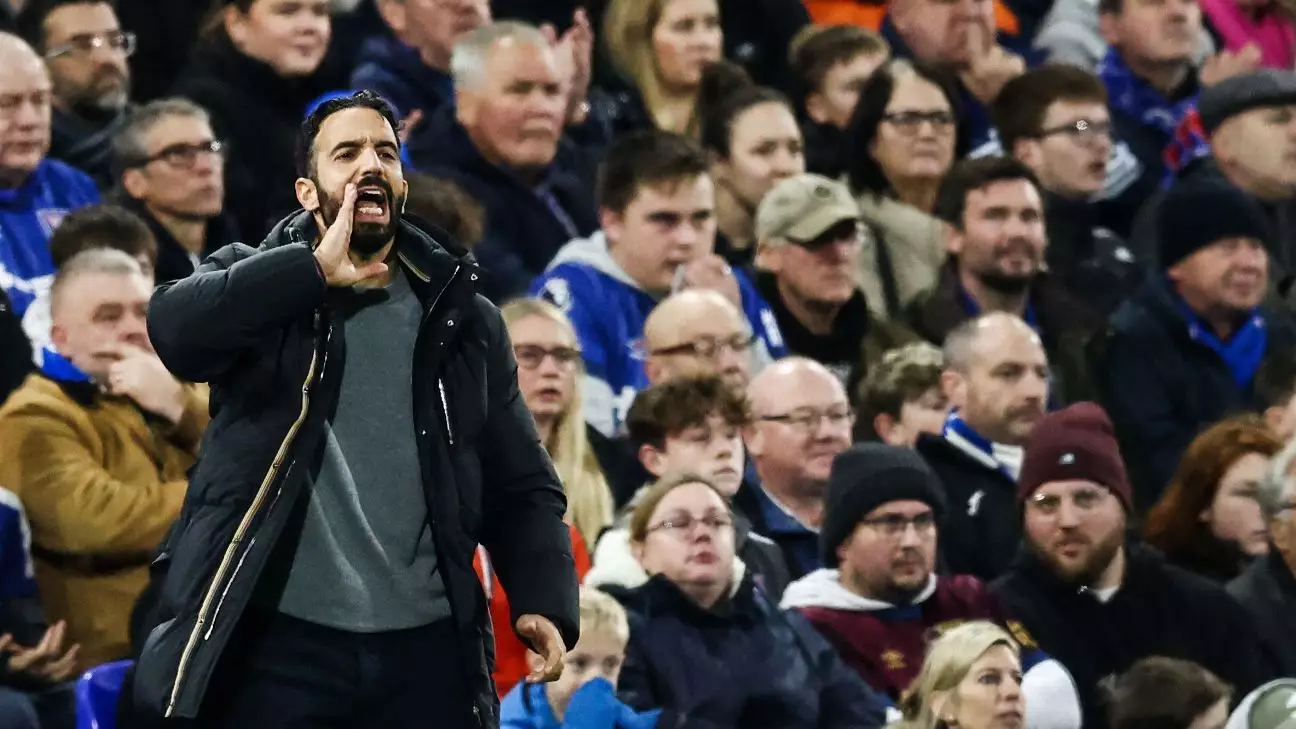Ruben Amorim’s debut as the new head coach of Manchester United could be likened to a double-edged sword; while it promised a fresh start, it quickly unveiled the daunting reality he faces at one of football’s most storied clubs. The initial excitement following Marcus Rashford’s early goal against Ipswich Town created an illusion of promise, but the subsequent 1-1 draw revealed the severe challenges lurking within the squad. Amorim, the sixth coach tasked with restoring the glory days once enjoyed under Sir Alex Ferguson, needs not just talent but a revolution in mindset, tactical acumen, and overall team cohesion.
The disappointment was palpable as the match unfolded. Despite Rashford’s early strike igniting hope, the United side failed to maintain their momentum. Instead, they allowed Ipswich back into the game, culminating in a stunning equalizer from Omari Hutchinson just before halftime. The frustration mounted as Amorim was seen urging Joshua Zirkzee to push forward when his nonchalance reflected a lack of urgency—a symptom of the malaise that afflicts this storied club. Such moments illustrate that Amorim’s task is far more complex than mere tactical adjustments; he must also breathe fresh life into players who have been weighed down by past failures.
Amorim’s visible frustration at the match’s conclusion was indicative of a larger issue: a lack of collective purpose among the players. The audacity of demanding more from Zirkzee at such a critical juncture underlines a perception of responsibility that Amorim seems eager to instill. His visible desire to see players advance during tense moments highlights his win-at-all-cost mentality, one that has borne fruit in his prior role with Sporting CP, where he ended a 20-year wait for a league title.
Nevertheless, transferring this mentality to a Manchester United squad burdened with a history of underachievement would take time and persistence. Players need to shed the excessive caution that seems to have crept into their game—a sentiment voiced by Amorim himself when he remarked, “I think my players were thinking too much.” This hesitation stifles their natural ability, rendering the vibrant attacking football Amorim advocates nearly impossible.
Amorim stepped into the coaching role facing the stark truth of a squad that requires significant overhaul. His selection choices against Ipswich, particularly the reliance on seasoned yet aging players like Casemiro and Christian Eriksen in central midfield, exposed deeper issues concerning depth and fitness. With key defenders sidelined, the makeshift three-man defense comprising Noussair Mazraoui, Matthijs de Ligt, and Jonny Evans barely held together against an invigorated Ipswich side that capitalized on United’s frailties.
Moreover, the coach’s chosen 3-4-2-1 formation, although effective during his time at Sporting, requires players who can execute its demands with high energy and sharp execution. The ineffectiveness of the forward line—aside from Rashford’s isolated brilliance—demonstrated a disconnect from the philosophy Amorim hopes to instill. The glaring lack of midfield dynamism allowed Ipswich to dominate possession, depriving United’s attackers of meaningful service and ultimately emphasizing the perilous state of the squad.
Despite a less than stellar start, Amorim’s commitment to his vision and adaptability will be his strongest allies in this uphill battle. He acknowledged the difficulties of restructuring tactics in such a limited time frame and the resultant learning curve for players. Amorim expressed understanding toward frustrated fans, admitting, “We are changing so much with a lot of games. We will try to win games, but this will take time.”
While the match against Ipswich may have deterred the optimistic narrative, it provides critical insights into what needs to be rectified. The instinctive understanding of positioning and responsibilities displayed by the players suggests that under the right guidance, positive changes could emerge. However, patience will be essential as the squad grapples with implementing a fresh tactical blueprint.
Amorim may not have secured a victory on his debut, but the journey of transformation is rarely linear in football. The 81-second high of Rashford’s goal is now a distant memory overshadowed by the realities of hard work ahead. If Amorim is to fulfill the promise of “making United great again,” the foundations must be laid carefully, with every player engaged and every tactic meticulously refined.

